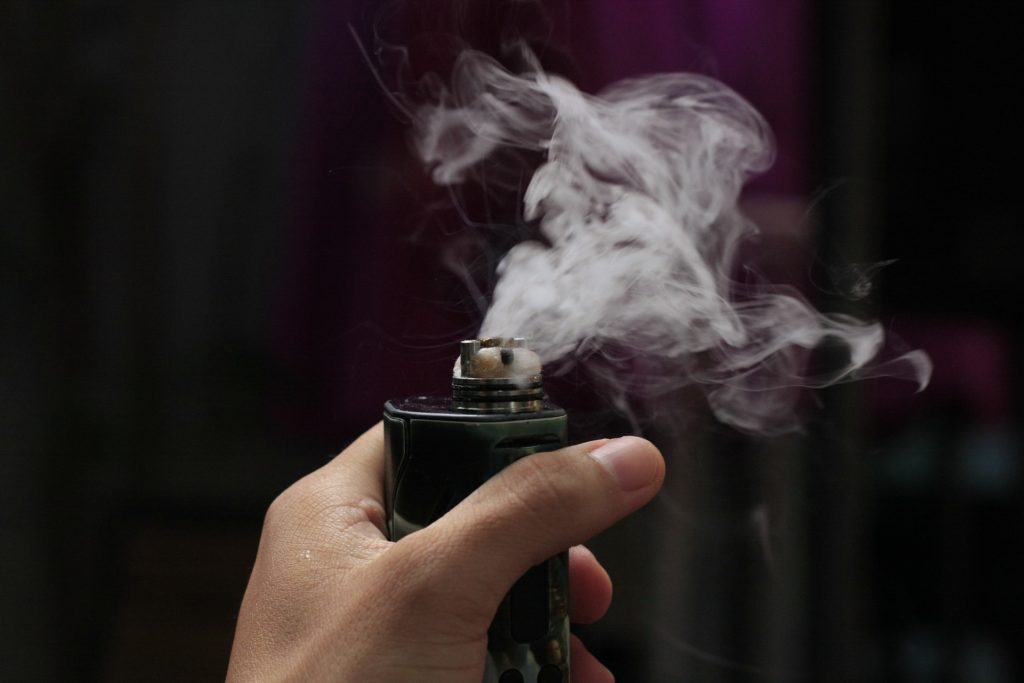
Youth and vaping: No such thing as risk-free
Vaping—it’s gone from relative obscurity to extreme popularity in just a few years.
Vaping has recently gained cool status among teens for its reputation as a safer, less harmful, way to smoke. Because of its discrete look, sweet flavours, and smoke tricks have contributed to its rise in popularity among youth. While vaping may be less harmful than smoking, it still comes with physical and mental health risks.
What is vaping?
Vaping, also known as “juuling”, is the act of inhaling an aerosol or “vapor” that is produced by a vaping device, such an e-cigarette. Unlike smoking tobacco or cannabis, nothing is burned when you vape. Instead, the vapour is produced by heating a liquid, or e-juice. During this process, contaminants may get into the vapour, which is then inhaled.
Why vaping appeals to youth
Vaping appeals to youth for several reasons, such as:
1. Flavours

The e-juice comes in a variety of fruity and sweet flavours which are marketed with trendy names. Some e-juice flavours are even made to taste like popular cereal brands. These flavours may entice youth to try vaping, as it mimics the pleasant taste of familiar foods.
2. Discretion
Vapes are designed to be discreet, making vaping indoors very popular among youth. Juuls and other popular vaporizers are designed to look like USB sticks, which can be hidden easily. And since the vapour doesn’t combust, the odor from the vape doesn’t linger.
3. Tricks
Vapour can be exhaled in different shapes, making smoke tricks a popular activity among youth. It has become popular to challenge your friends to see who can perform the best tricks, and post your skills in videos online.
Not risk-free
A recent survey from Health Canada showed that 23% of students in grade 7-12 have tried an electronic cigarette. Vaping is thought to be healthier than smoking because nothing is burned during the process. However, there often is nicotine in the e-juice, which is addictive and has negative effects on your health.
Possible physical effects of vaping include:
- Nicotine toxicity/poisoning
- Increased heart rate and blood pressure
- Seizures
“Enough research has not be done for us to know what exact effects it will have in the future, but it is not risk free,” says Monica Bennett, a health promotion specialist at Hamilton Health Sciences. Just like with other substances, youth are still developing and therefore are at a greater risk of negative consequences from substance use.
Effects on mental health
Dr. Natasha Johnson, a pediatrician and Adolescent Medicine Specialist in the Department of Pediatrics at McMaster Children’s Hospital, says that vaping can also affect the mental health of youth.
Issues include:
- Many people who vape end up smoking traditional cigarettes
- Negative impact to the developing teen brain
- Memory and concentration problems
“Youth who vape are four times as likely to start smoking combustible tobacco”
Monica and Dr. Johnson agree that vaping can become highly addictive. “32% of people who are exposed to nicotine can become addicted within 48 hours,” says Monica. Though sometimes marketed as “low nicotine,” vape e-juices are unregulated, therefore you never know what you are getting. Vaping is also often a gateway to further addiction. “Youth who vape are four times as likely to start smoking combustible tobacco,” says Dr. Johnson.
Talk about it
Unfortunately, vaping is not something that parents and adults can always police. It has entered schools and is not leaving anytime soon. “I have spoken with youth that have let me know that vaping is all over the place in high school,” says Dr. Johnson. “Students can vape in the bathroom and there won’t be any evidence, which makes it easier to use in a public setting” she says.
It is important for parents and adults to discuss vaping with youth, and explain the effects it can have on their health. Being open, honest, and providing them proper information, will help youth make smarter decisions about vaping and other addictive activities. Monica and Dr. Johnson recommend parents raise the topic with their kids in a non-confrontational way, so they are more likely to share openly.
